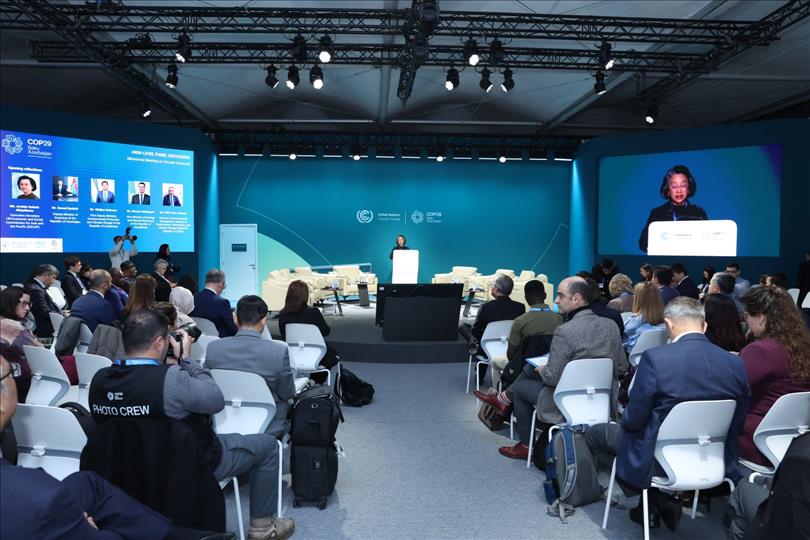
COP29 Hosts ECO Ministerial Meeting On Circular Economy (PHOTO)
Circular economy is a regenerative economic model designed to conserve resources. This model offers solutions to address crises such as climate change, pollution, and biodiversity depletion.
At the event titled "Empowering Interregional Partnerships for Circular Economy Transition: Towards a Climate Resilient and Sustainable Future via Resource-Efficiency," Deputy Minister of Economy Samad Bashirli emphasized the important role of the ECO in fostering economic cooperation among member states.
It was noted that the ECO region, with its vast economic resources, is uniquely positioned to lead in promoting sustainable development.
The ECO serves as a crucial platform for addressing critical issues, from energy security to environmental sustainability. The organization has important initiatives promoting circular economy.
The "Baku Declaration on Resource Efficiency and Circularity Agenda," which was adopted at the event, is a key document reflecting the collective commitment to resource efficiency. The declaration will create the conditions for the ECO region to take a leading role in the global transition to a circular economy.
Another document adopted was the "Joint Statement on Launching a Regional Initiative for Resource Conservation and Circular Economy in the OEC Region." This initiative aims to create a platform for regional cooperation to ensure a fair transition to a circular economy.
The member states and international partners will be involved in joint activities that foster innovation and increase resilience to climate change.
The event featured speeches from Secretary General of the Organization of Economic Cooperation Asad Khan, Executive Secretary of the UN Economic and Social Commission for Asia and the Pacific Armida Salsiah Alisjahbana, and Deputy Secretary-General of the UN and Executive Director of the UN Environment Program Inger Andersen.
They shared their views on the necessary conditions for developing the circular economy, joint initiatives among countries, strengthening international cooperation in this area, and other related issues.
Documents were presented, and discussions took place.
In the end, the "Joint Declaration on Baku Resource Efficiency and Circularity Agenda" and the "Joint Statement on Launching the Regional Initiative on Resource Efficiency, Sustainability and Circular Economy in the ECO Region (RESCUE)" were adopted.
To note, the 29th session of the Conference of the Parties to the UN Framework Convention on Climate Change (COP29), which will run until November 22, opened at the Baku Olympic Stadium on November 11. It is the largest event organized by Azerbaijan to date, and the first time in the region that it is being held in Azerbaijan.
Within COP29, the highest level event - the summit of world leaders on climate action - was held on November 12–13.
The main expectation from COP29 is to agree on a fair and ambitious New Collective Quantitative Goal (NCQG) on climate finance. The COP29 chairmanship has launched 14 initiatives that include linkages between climate action and the Sustainable Development Goals, including green energy corridors, green energy storage, harmony for climate resilience, clean hydrogen, methane reduction in organic waste, action on green digital technologies, and other topics.
In addition to being a top priority that creates the conditions for action, creating climate finance will also help fulfill the 1.5°C pledge by bringing everyone together.
The UN Framework Convention on Climate Change is an agreement signed at the Rio Earth Summit in June 1992 to prevent dangerous human interference in the climate system. The acronym COP (Conference of Parties) stands for“Conference of Parties” and is the highest legislative body overseeing the implementation of the Framework Convention on Climate Change.
A total of 198 countries are parties to the Convention. Unless otherwise decided by the parties, COP is held annually. The first COP event was held in March 1995 in Berlin, and its secretariat is located in Bonn.

Legal Disclaimer:
MENAFN provides the
information “as is” without warranty of any kind. We do not accept
any responsibility or liability for the accuracy, content, images,
videos, licenses, completeness, legality, or reliability of the information
contained in this article. If you have any complaints or copyright
issues related to this article, kindly contact the provider above.


















Comments
No comment